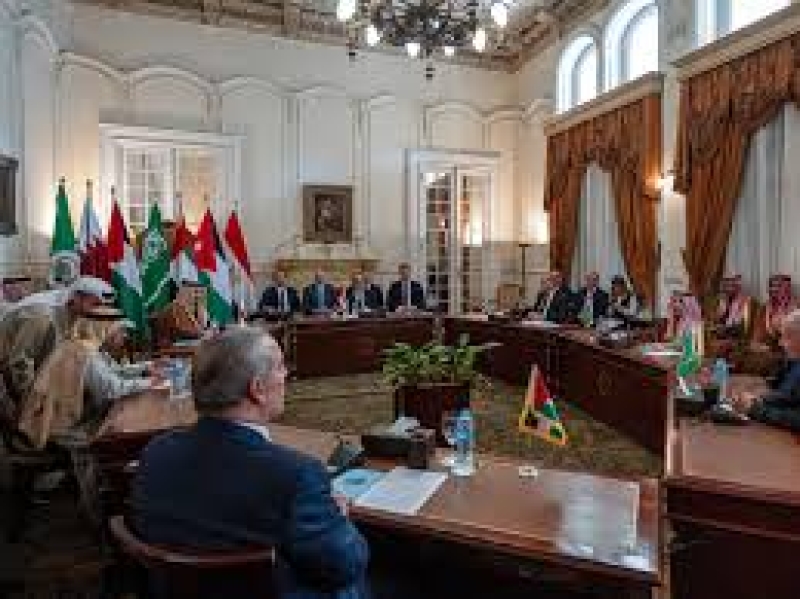- Power generation at Payra Thermal Power Plant 1st unit starts after a month |
- Irregularities, injustice will no longer be accepted in politics: Jamaat Ameer |
- 2 arrested in Jhenaidah for allegedly selling madrasa student |
- Koko’s wife campaigns for Tarique in Dhaka-17 |
- Bangladeshi Expats Cast 4.58 Lakh Postal Votes |
Arab Leaders Meet in Saudi Arabia to Reject Trump's Gaza Plan

Arab leaders are set to meet in Saudi Arabia this Friday to formulate a unified response to President Donald Trump's controversial plan for US control over Gaza, which includes relocating its 2.4 million inhabitants to Egypt and Jordan, diplomatic sources have confirmed.
Trump's proposal has sparked significant outrage globally and led to unprecedented unity among Arab nations in rejecting the plan. However, disagreements persist among these states regarding the governance of Gaza and who will bear the costs of its reconstruction.
Umer Karim, a Saudi foreign policy expert, told AFP that the summit will be one of the most significant in recent decades concerning both the wider Arab world and the Palestinian issue.
The plan ignited international condemnation after Trump declared that the United States would "take over the Gaza Strip" and relocate its residents, a move seen as an effort to permanently alter the region's demographic landscape.
A source close to the Saudi government revealed that the summit will focus on developing a comprehensive reconstruction initiative in direct opposition to Trump’s proposal.
King Abdullah II of Jordan, during his meeting with Trump in Washington on February 11, mentioned that Egypt would soon present its own plan. The Saudi source indicated that the summit will primarily discuss "a version of the Egyptian plan" presented by the king.
Initially, the summit was set to involve Saudi Arabia, Egypt, the UAE, Qatar, and Jordan. However, it has since expanded to include all six members of the Gulf Cooperation Council (GCC) and representatives from the Palestinian Authority.
For Palestinians, any effort to expel them from Gaza evokes memories of the "Nakba" or catastrophe of 1948, when hundreds of thousands of Palestinians were displaced during the establishment of Israel.
Reconstruction Plans
Reconstruction will be a critical point of discussion, as Trump has justified his plan by citing the need to rebuild Gaza's war-torn infrastructure.
While Egypt has yet to officially release its counterplan, former Egyptian diplomat Mohamed Hegazy outlined a plan in three phases, expected to span three to five years. The first phase, called "early recovery," would last six months and focus on clearing debris and establishing temporary safe zones for displaced residents.
The second phase would involve an international conference to focus on rebuilding Gaza's utility infrastructure. The final phase would include urban planning, housing development, and improvements to education and healthcare services.
A UN estimate has pegged the cost of Gaza's reconstruction at over $53 billion, with more than $20 billion required in the first three years alone. The final phase would also aim to reintroduce a political track for a two-state solution, promoting a sustainable truce between Palestinians and Israelis.
Umer Karim noted that implementing this plan would demand unprecedented Arab unity, a feat not seen in decades.
Financing Challenges
One of the most significant hurdles for the Egyptian plan, according to an Arab diplomat with knowledge of the Gulf states, is financing. While countries like Kuwait might contribute for humanitarian reasons, other Gulf states, such as Saudi Arabia and the UAE, may only provide funding if Qatar and Egypt can make guarantees about Hamas's role.
Karim added that the Saudi and Emirati governments would not fund the reconstruction unless they receive assurances from Egypt and Qatar regarding Hamas's involvement in Gaza's future governance.
Egypt's plan envisions a post-war Gaza under a Palestinian administration that would not be aligned with any particular faction, with "experts" leading it rather than any specific political party. This administration would be politically subordinate to the Palestinian Authority.
In addition, the plan calls for a joint security force made up of Palestinian Authority police and supplementary forces from Egypt, Arab states, and other international contributors.
Despite the shared goal of rebuilding Gaza, differences remain. While Hegazy believes Hamas will retreat from the political scene, a Saudi source emphasized Riyadh's desire for Gaza to be governed by the Palestinian Authority.
Qatar, a major mediator in the ongoing conflict, maintains that the future of Gaza must be determined by the Palestinians themselves.
Karim concluded, "All regional actors understand that any proposed plan must exclude Hamas to gain favor with the US and Israel. Fundamental changes are needed within Gaza for this plan to have a realistic chance of success."

